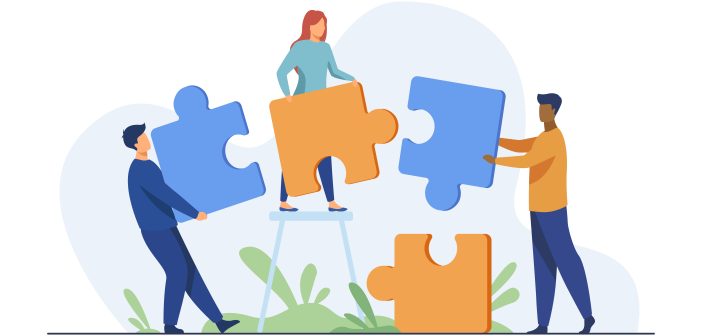By Linus Okados Dube.
Teamwork is a limitless Management process. It involves a mix of tasks and activities carried out by individuals who integrate and effectively align with each other to achieve common desired targets.
Teamwork importance in Organizations
Teamwork groups are used in a myriad of ways and in many different industries to increase performance, employee unity, and company culture. This includes Companies that must frequently develop new ideas or products using a project-based approach and assemble teams to diffuse responsibility and to increase the limitless Management in a number and diversity of ideas for the project.Team members use brainstorming in teamwork to reach a consensus on ideas before deciding on the development methodology for a project.
Enhances and Promotes Problem Solving
The intense synergy gained from multiple minds working on a solution solves issues thoroughly. The team limitless approach creates a pool of expertise for specific given company problems, using this methodology of teamwork, the team pool generates unique methods or ideas for proving solutions.
Problems, in many cases, are not purely negative. The problem could arise when developing a product for a consumer to address such a problem. Two or more people working together also build upon one another’s ideas, weeding out the suboptimal parts and making the ideas better.
Sustains and Improves Communication of Ideas
Teamwork is the main enhancer of effective communication within a company. When employees work as
individuals or independently on projects, they may not readily share their expertise of knowledge or new information. Ineffective communication delays the completion of projects, tasks, or the development of solutions.
Teamwork effectively promotes and integrates and aligns workings among employees on the work and the tasks at hand and, in the process prevents employees from working in opposite directions.Supports and Increases Work-Flow Speed Teamwork enhances Cohesion which is an important byproduct of a company.
This bond of employees could be the result of intense trust or from working on projects as a team. Team working is less likely to be confrontational toward one another and more accepting of each other’s decision This togetherness in teams can greatly increase the workflow speed of a company.
Learning curve sustainer for Team Members
When employees work as a team within a company, every employee draws from each other’s knowledge. This is not limited to the personal experiences of coworkers;employees from different departments may learn information from each other regarding the limitations and possibilities of those departments. In the case of a marketing department consistently making demands with unrealistic deadlines to another department, the marketing department may demand teamwork through its requests are unreasonable.
Enhances the Feeling of Belonging
When a team is cohesive and works well together, it gives team members a feeling of belonging. Everyone wants to be in a winning team, but one can’t win all the time. Teams make challenges more bearable because of sharing issues. Members brainstorm on every material issue. This promotes strong working
relationships.
Groups benefits in the Workplace
The concept of working independently by individuals is replaced by collaborative teamwork in some offices. Group work can be challenging when you have different personalities on the team, but this also provides benefits to the company and individual employees. The team members need practical training to deliver effectively to benefit the team.
Shared pool Experience and Knowledge
Each employee comes to a company with unique skills and knowledge. Some of these overlap while others are distinct. Terms benefit from an easy learning curve. Pooled experience tackles with ease a difficult project with different facets. Pooled experience solves problems faster. Group teams draw on the expertise of each other.
Supports and enhances Idea Generation
The team environment requires employees to discuss the project intensely this leads to the generation of more ideas. The discussion encourages greater creativity and propounds new better ideas. Working
individually limits one’s ideas on the project without the perspective of other colleagues’ ideas. Teams may discover new ways to a particular task that could be more effective.
Double Fact-Checking supports
A specific project relies on one employee to get the facts correctly. To have an inbuilt working system on the same project a company must enhance a built-in system of checks and balances. When all team members are actively engaged in the project, they are more likely to see a mistake and correct it before it turns into a major problem.
Support
Teamwork gives a sense of security and support to a team and this may encourage employees to take more risks. Where an employee may be conservative when working on an individual project, this may not be so in teams. For instance,Working individually sometimes creates a sense of isolation and makes employees feel as if they have no one else behind them.The team environment helps employees to increase productivity and become more motivated at work.
The Causes of Conflict between Employees in an Organization
When people work together, conflict is a part of doing business–it’s a normal occurrence in any workplace. Notably, managers spend a minimum of twenty five percent of their time settling the conflict at the workplace, according to the University of Colorado Faculty and Staff Assistance Program. Workplace conflict at work originates within and without workers in an organization.
Differing Values
The workplace consists of individuals with different cognitive or perceptions of the world. Some have strong beliefs which cannot change willingly.The beliefs could differ from other coworkers’ perceptions.A showcase could be one individual who strongly opposes other diversity and may have trouble accepting otherworkers’ views. To avoid conflict with these workers, he must try to accept or initiate more tolerance of those with differing views.
Opposing Interests
When an employee decides to pursue their own career goals, without regard for the organizational goals and others’ wellbeing, it could result in strife. This occurs when the employee focuses on achieving their own objectives at the expense of disregarding another objective within the company.If this is not addressed it creates sub-optimality and in addition, conflict might arise.
Each employee comes to a company with unique skills and knowledge. Some of these overlap while others are distinct. Terms benefit from an easy learning curve. Pooled experience tackles with ease a difficult project with different facets. Pooled experience solves problems faster. Group teams draw on the expertise of each other.
Personality Conflicts
Because of different perceptions, conflicts arise in the organization. Therefore, individual differences at work are normal.Problems arise when the workers differ because their no formal mechanism of solving the conflict at hand. For instance, the more extroverted employee may feel slighted if the more introverted worker doesn’t talk to them. They might perceive it as a slight difficulty, rather than seeing it simply being an employee’s personality. Furthermore, the approach to handling projects may be analytical while others are intuitive. When the two do not understand and respect each other’s approaches, conflict occurs.
Poor Communication
Poor communication can lead to misunderstanding and strife among employees.Conveying wrong information can lead to projects not reaching their objectives and to participants blaming each other for the end result.
Personal Problems
Team management encourages the employees to focus on formal duties other than personal problems. Such as marital or parental issues, Consequently, Workplace groups are becoming more common in today’s organizations.Companies seek synergy which adds value to the development of groups working on projects Project managers are the lead leaders from all departments and work with their clients to implement programs.The boundless Groups also help to solve operational problems, like quality and customer service, and remain as a team until the problem is reduced or eliminated. The Groups among other things help improve the communication and problem-solving abilities of participants and create professional relationships that are valuable sources of additives.
Enhances Projects development
In project management managers of many companies draw together people of different calibers from different departments to implement programs and projects. He guides the teams and together, produces products or programs for a client. Team members bring expertise from marketing, accounting, human
resources, training, and operations to meet deadlines and complete viable agreed-upon projects. Drawing from the collective power of each team member, the group accomplishes much more than it could have managed alone. These systems of managing projects are becoming more common as they consistently produce outstanding results.
Teambuilding
Limitless teams working together leads to increased expertise growth for a company. This enhances viability. This also creates Opportunities of working with people and departments with whom the organization rarely interacts hence bringing increased understanding and cooperation in the organization. The ability to understand the work of other departments also develops when groups work toward a common goal. Unlimited Teams occur naturally in the course of a project or assignment and further cooperation for future projects is more likely. Unlimited teams develop a cohesive spirit over time and everyone in the company benefits.
Creativity enhancement
Creativity is enhanced in group work due to a lot of brainstorming sessions, where ideas are shared in a team increases creativity. The otherwise very difficult problems are also resolved in teams. Often the experienced group member becomes the reference to the less experienced. They bring up ideas that become the solution providers. Needless to say, New and exciting products and concepts arise when
groups work together to solve problems.
Group’s success factor
The vital key to success in groups is the time frame and employing its use at the right time. Groups manifest well when there is enough time for implementation. This may include adequate time for brainstorming on issues and resolutions. It does not work well on urgent solution-oriented issues. Ideal for Complex projects and assignments.Groups are used effectively in training and educational opportunities.Onboarding of new employees learn on the job from experienced team members and become more productive in a shorter period in groups..
In a nutshell, teamwork brings new ideas and helps in solving problems. It’s supportive and builds morale.
By Linus Okados Dube




